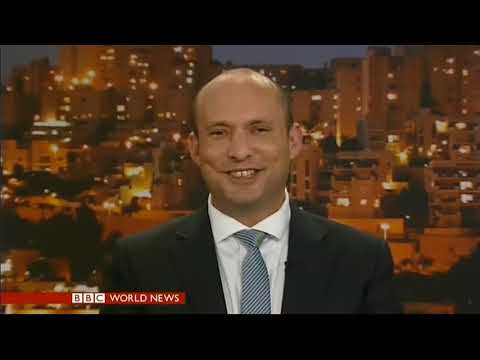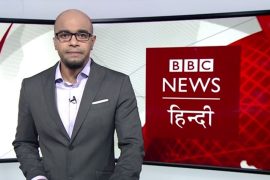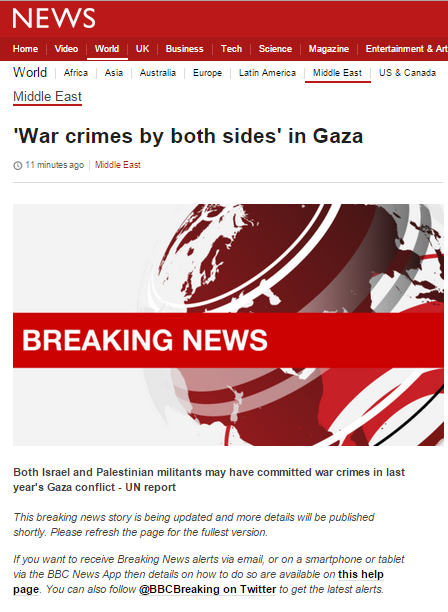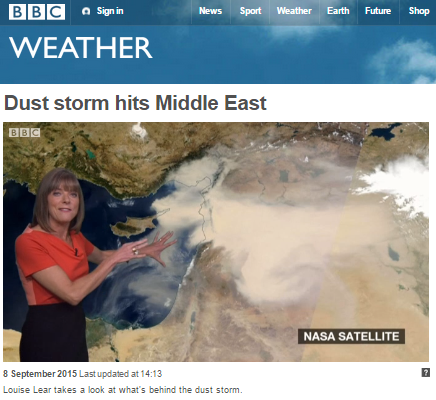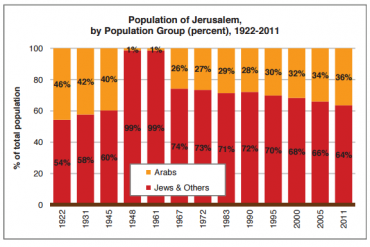The guest on the December 19th edition of the BBC News Channel programme ‘Hardtalk‘ was Israeli education minister Naftali Bennett. The show was repeated on the same television channel the following day (available here to UK-based readers and here with Hebrew subtitles) and a clip from that interview was also promoted on the BBC News website. In addition, an audio version (available here) was aired on BBC World Service radio on December 20th.
“Israel’s prime minister Benyamin Netanyahu took great satisfaction from President Trump’s decision to ignore longstanding international convention and recognise Jerusalem as Israel’s capital. But that diplomatic boost can’t disguise Mr Netanyahu’s vulnerability at home. He’s the target of a long running police anti-corruption investigation and may soon face charges. Stephen Sackur speaks to Cabinet Minister Naftali Bennett who has declared he wants to be Israel’s next Prime Minister. Is a changing of the guard in the offing?”
In the first third or so of the interview presenter Stephen Sackur focused on a topic one cannot imagine would have been of particular interest to most audience members: domestic Israeli politics.
A theme promoted throughout much of the interview was – predictably – the December 6th US announcement recognising Jerusalem as Israel’s capital, with Sackur noting “strong” objection to that move and an “international consensus” against the recognition. After Bennett had pointed out that Jerusalem’s status as the capital of Israel does not depend on international approval, Sackur interjected (11:47 in the audio version). [emphasis in italics in the original]
Sackur: “Yeah, listen: I’m not…I’m not in the business of disputing that your Knesset’s in Jerusalem, your prime minister’s office is in Jerusalem, many of your ministerial offices are in Jerusalem. Of course that is a fact. What is also a fact is that the international community – bar Donald Trump, insofar as we take this decision seriously – the international community still sees that the whole issue of Jerusalem’s future and sovereignty to be discussed as part of a peace settlement between you and the Palestinians.”
Bennett: “I get it but they’re wrong. And no settlement – no peace settlement – can be predicated on dividing up Jerusalem. There will never be peace based on a divided Jerusalem. […] We cannot divide Jerusalem and expect good things to happen. So Jerusalem will remain unified under Israeli sovereignty forever. That’s a fact.”
Sackur then began to paint a noteworthy portrait of Jerusalem. [emphasis in bold added]
Sackur: “Jerusalem isn’t unified and when you said recently, you know, in…in saluting the Trump decision you said ‘for the past 25 years we’ve been failing peace precisely because it’s been predicated on putting fences in the heart of Jerusalem and now that’s not going to happen and we can do peace’, I mean you’re ignoring…you’re ignoring the reality that actually there is a wall, a fence – call it what you will – that runs through Jerusalem built by your government because you know de facto Jerusalem is still divided and a quarter of a million Arabs live in occupied East Jerusalem and that they still insist East Jerusalem will one day be their eternal capital.”
Sackur is apparently able to ignore the irony of the fact that while on the one hand he rebukes Bennett (and Trump) for calling Jerusalem Israel’s capital, invoking an ‘international consensus’ according to which the city’s status will only be determined through negotiations, on the other hand he has no problem advocating for the same claim from the other side of the conflict. Bennett responded:
Bennett: “Well you’ve got your facts wrong. I happen to work in Jerusalem every day and I drive through the Old City. There’s no wall between the west and east Jerusalem. There is no west and east Jerusalem. There is just Jerusalem. I can get out of this studio, get in a car and drive directly to the Western Wall or Temple Mount. There’s no…”
Sackur [interrupts]: “Well hang on a minute. I didn’t couch my question in terms of the Old City. You know as well as I do there are many points in Jerusalem where you can go up to a great big wall. On one side is the Jewish residential area. On the other side is the Arab residential area. And if you don’t call it a wall, you can call it a fence. Call it what you like but Jerusalem still has a divide.”
Obviously BBC audiences would understand from Sackur’s portrayal of Jerusalem that “a great big wall” separates Arab and Jewish areas in Jerusalem. As the map below – produced by the BBC’s go-to NGO B’tselem – shows and as Naftali Bennett later clarified, that is not the case. The anti-terrorist fence (and notably Sackur displayed no interest in explaining to his viewers and listeners why it had to be built) which is marked in red on the map actually runs more or less along the city’s municipal boundary – marked in yellow. On the same side of the fence as Jewish neighbourhoods are Arab neighbourhoods such as Sur Baher, Abu Tur, Silwan, Issawiya and Jabel Mukaber.

Later on in the programme (from 19:50 in the audio version) Sackur painted another distorted portrait intended to influence audience perceptions.
Sackur: “Mr Bennett […] I just wonder whether you might be misreading Europe, Mr Bennett, because I see one of your ministerial colleagues, the intelligence minister Yisrael Katz, said the other day [sic] that Israel is prepared to ‘bomb Lebanon into the stone age’ in its pursuit of Hizballah. Do you really think that sort of language wins you friends in Europe?”
Despite Sackur’s inaccurate claim, Katz’s comments were made at the beginning of November rather than “the other day” and – undisclosed by Sackur to BBC audiences – they came in response to threats from Hizballah’s leader.
“Transportation Minister Yisrael Katz warned Tuesday that Israel was prepared to completely eviscerate Lebanon in response to any cross-border missile attack by Hezbollah.
Katz (Likud) was responding to a fiery speech by the Shiite group’s head Hassan Nasrallah earlier in the day in which the extremist leader claimed that his organization’s rockets can hit anywhere in Israel and threatened to target the country’s sea ports and main airport in the next conflict.”
Although Bennett pointed out that Katz’s words related to a scenario in which Hizballah once again attacked Israel with missiles, Sackur condescendingly continued to lecture his interviewee while painting his portrait of Israeli politicians as rash extremists and downplaying the threat from the Lebanese terror organisation.
Sackur: “So as a senior member in the government, a member of Netanyahu’s security cabinet, a man who wants to be the next prime minister of Israel, you’re suggesting to me that you, as a leading Israeli voice, believe that it would be – what? – sensible, wise, responsible for Israel to consider bombing Lebanon to the stone age in response to what you see as Hizballah’s threat coming from Lebanon?”
Unfortunately for the BBC’s funding public, ‘Hardtalk’ interviews with Israeli public figures invariably fail to make the most of the opportunity to allow viewers to hear an Israeli point of view. Instead – as we see once again in this latest example – Stephen Sackur is usually much more interested in lecturing his guests, promoting his own patronising opinions, his political agenda and his selective and inaccurate caricatures of issues BBC audiences rarely get to see from a perspective that does not comply with the BBC’s selected narrative.
Related Articles:
Israeli guest tells BBC’s ‘Hardtalk’ host ‘you rewrite the history’ – part one
Israeli guest tells BBC’s ‘Hardtalk’ host: ‘you rewrite the history’ – part two
‘Hardtalk’: a test case for BBC claims of ‘equal coverage’
BBC Hardtalk for Israel, Softchat for Palestinians

